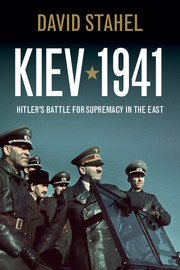Book contents
- Frontmatter
- Contents
- Figures
- Tables
- Maps
- Acknowledgements
- Glossary of terms
- Tables of military ranks and army structures
- Introduction
- 1 The bulldog, the eagle and the bear
- 2 Germany's defeat in the east
- 3 The road to Kiev
- 4 War in the Ukraine
- 5 Ominous horizons
- 6 The battle of Kiev
- 7 Slaughter in the Ukraine
- 8 Visions of victory
- 9 The calm before the storm
- 10 Moscow in the crosshairs
- Conclusion
- Notes
- Bibliography
- Index
1 - The bulldog, the eagle and the bear
Published online by Cambridge University Press: 05 November 2011
- Frontmatter
- Contents
- Figures
- Tables
- Maps
- Acknowledgements
- Glossary of terms
- Tables of military ranks and army structures
- Introduction
- 1 The bulldog, the eagle and the bear
- 2 Germany's defeat in the east
- 3 The road to Kiev
- 4 War in the Ukraine
- 5 Ominous horizons
- 6 The battle of Kiev
- 7 Slaughter in the Ukraine
- 8 Visions of victory
- 9 The calm before the storm
- 10 Moscow in the crosshairs
- Conclusion
- Notes
- Bibliography
- Index
Summary
Working for the Soviet theatre – Britain and America's supporting roles
The danger of assessing any one aspect of Germany's wars between 1939 and 1945 is that the process necessitates a certain degree of neglect. Without an appreciation of the bigger picture the vital tools for contextualization are absent. The proliferation of histories focused exclusively on the exploits of the Anglo-American war experience has tended to leave readers attributing an overblown significance to the contribution of the Western Allies. While the role of the west in the defeat of Nazi Germany is certainly an essential one, no other nation suffered or sacrificed more than the Soviet Union between 1941 and 1945. In order to appreciate the scale and importance of the fighting at Kiev, as well as to weigh correctly the vital role played by the Western Allies until September 1941, a certain overview is in order.
On 8 July 1940 the British Prime Minister, Winston Churchill, wrote to Lord Beaverbrook, his minister for aircraft production, about the difficulty of Britain's position in the war. In the wake of Hitler's swift conquest of France, Churchill was desperate for any means to strike back, and confided in Beaverbrook that his ministry provided the only means. As Churchill explained:
[W]hen I look around to see how we can win the war I see that there is only one sure path. We have no continental army which can defeat the German military power. The blockade is broken and Hitler has Asia and probably Africa to draw from. Should he be repulsed here or not try invasion, he will recoil eastward, and we have nothing to stop him. But there is one thing that will bring him back and bring him down, and that is an absolutely devastating, exterminating attack by very heavy bombers from this country upon the Nazi homeland. We must be able to overwhelm him by this means, without which I do not see a way through.
Churchill was correct. Hitler did not attempt invasion and did indeed recoil back towards the east. Yet the extent to which Churchill in July 1940 might have foreseen a future confrontation between Germany and the Soviet Union was at least as much a product of fervent hope as of any hard evidence. Churchill correctly understood that in any ensuing German--Soviet confrontation Britain's war would become a peripheral one without the means to strike at Hitler decisively. Where Churchill was wrong was in his ardent enthusiasm for the effects of strategic bombing. In spite of the optimism expressed by Bomber Command, the ‘absolutely devastating, exterminating’ attacks in which Churchill placed his faith were still years away. Early in the war British bombers had no radio navigation aids, no radar and only substandard bomb-sights. Crews flew into Germany navigating by the stars and located their target areas by moonlight. Such methods required good flying conditions and clear skies, which also favoured German countermeasures. Ultimately the early bombing campaign was so inaccurate that German intelligence had trouble understanding what goals the British were attempting to pursue.
- Type
- Chapter
- Information
- Kiev 1941Hitler's Battle for Supremacy in the East, pp. 11 - 47Publisher: Cambridge University PressPrint publication year: 2011



